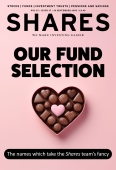Archived article
Please note that tax, investment, pension and ISA rules can change and the information and any views contained in this article may now be inaccurate.
Are we about to see a resurgence of bad loans as the US economy slows?

Although most US banks reported forecast-busting earnings for last quarter, with many describing the US economy and the consumer as ‘resilient’, we have started to notice a subtle increase in bad loans, which is often the precursor to a more general malaise.
That doesn’t mean the US is necessarily going into a recession, or that the banks will go through a repeat of the Global Financial Crisis, but the obvious slowdown in the US economy since the start of the year does mean we should keep our eyes and ears open for signs of trouble.
Also, it is typically at the end of a bull market that fraud and other misdeeds get exposed, and we may be witnessing the first of a string of defaults with the demise last week of sub-prime vehicle finance provider Tricolor.
AND SO IT BEGINS
Last week, Ohio-based lender Fifth Third Bancorp (FITB:NASDAQ) revealed in a regulatory filing it had discovered ‘alleged external fraudulent activity’ at a commercial borrower associated with their asset-backed finance loan.
The bank said the outstanding balance on the borrowing was $200 million, and estimated it would need to take a non-cash impairment charge in the third quarter of between $170 million and $200 million, without naming the counterparty.
However, it soon emerged the customer was Tricolor, and alongside Fifth Third, Barclays (BARC) and JPMorgan Chase (JPM:NYSE) may also be on the hook, potentially for hundreds of millions of dollars.
According to Bloomberg, Tricolor focuses on lending to ‘borrowers across the US southwest who typically have poor or no credit scores’.
It funds its loans to customers by packaging them into ABS (asset-backed securities) and selling them to bond investors, exactly the kind of practice which subprime mortgage lenders were engaged in during the mid-2000s and which led to the property market crash.
Barclays and JPMorgan recently led a $217 million sale of Tricolor bonds, and together with Fifth Third have been ‘warehouse lenders’ to the firm meaning they supplied short-term revolving credit facilities.
Since 2022, Tricolor has sold some $2 billion worth of asset-backed loans, many of which remain outstanding and are sitting on investors’ books.
PROVISIONS CREEPING UP
JPMorgan Chase made no mention of Tricolor in its second quarter results, although it did increase its provision for credit losses to $2.8 billion, most of which was for card services, and it increased reserves against bad loans in its wholesale lending business, but it maintained the economy was ‘robust’.
Rival Bank of America (BAC:NYSE) said consumers ‘remained resilient, with healthy spending and asset quality’, and commercial borrowing increased.
The bank also said asset quality remained strong, with net charge-offs at $1.5 billion for the sixth consecutive quarter, and claimed consumer delinquencies were stabilizing, while card net charge-offs improved year-over-year and commercial nonperforming loans actually declined from the previous quarter.
The interesting thing is, data from the various Federal Reserve banks show a clear upward trend in bad debts across the US banking system.
Household debt in the US reached $18.4 trillion in the second quarter, up $185 billion on the first quarter, mostly due to growth in mortgage borrowing and car loans.
Aggregate delinquency rates ‘remained elevated in the second quarter, with 4.4% of outstanding debt in some kind of delinquency’ according to the New York Fed’s Quarterly Report on Household Debt and Credit.
Also, data from the St Louis Federal Reserve shows household delinquencies and business delinquencies rising towards levels last seen during the pandemic, when many businesses found themselves in trouble and were only saved by the central bank slashing interest rates and the government handing out ‘stimulus cheques’.
Investors might therefore want to do their own due diligence to satisfy themselves we aren’t looking at a rise in bad debts and a subsequent drop in profitability, particularly given how well banks both in the US and the UK have performed in the last couple of years.
Important information:
These articles are provided by Shares magazine which is published by AJ Bell Media, a part of AJ Bell. Shares is not written by AJ Bell.
Shares is provided for your general information and use and is not a personal recommendation to invest. It is not intended to be relied upon by you in making or not making any investment decisions. The investments referred to in these articles will not be suitable for all investors. If in doubt please seek appropriate independent financial advice.
Investors acting on the information in these articles do so at their own risk and AJ Bell Media and its staff do not accept liability for losses suffered by investors as a result of their investment decisions.
Issue contents
Great Ideas
News
- Airtel Africa is one of the big surprise success stories of 2025
- Category killer Costco needs to deliver the goods next week
- Hikma Pharmaceuticals shares plumb new 20-month lows
- The IPO market is showing signs of life in both the UK and US
- Strategic Equity Capital offers investors their money back via tender offer
 magazine
magazine








